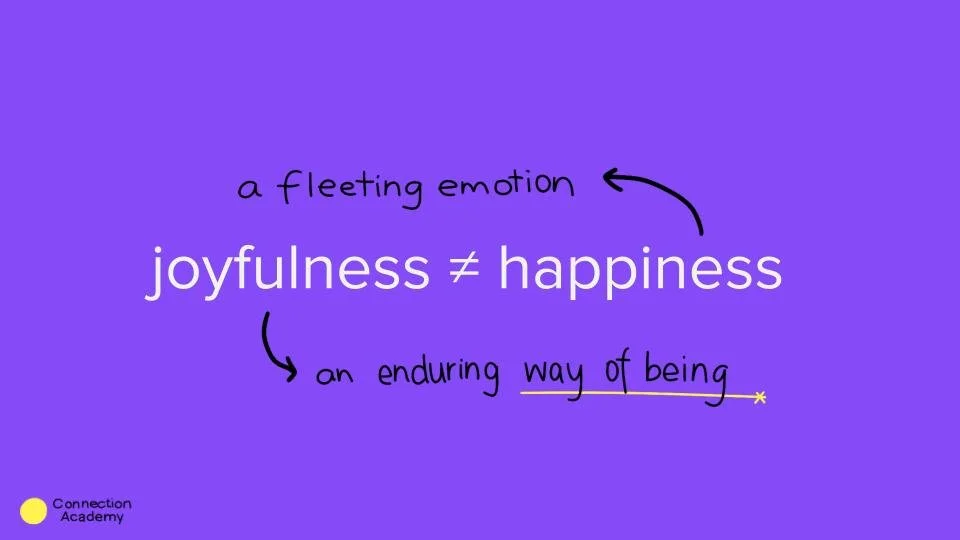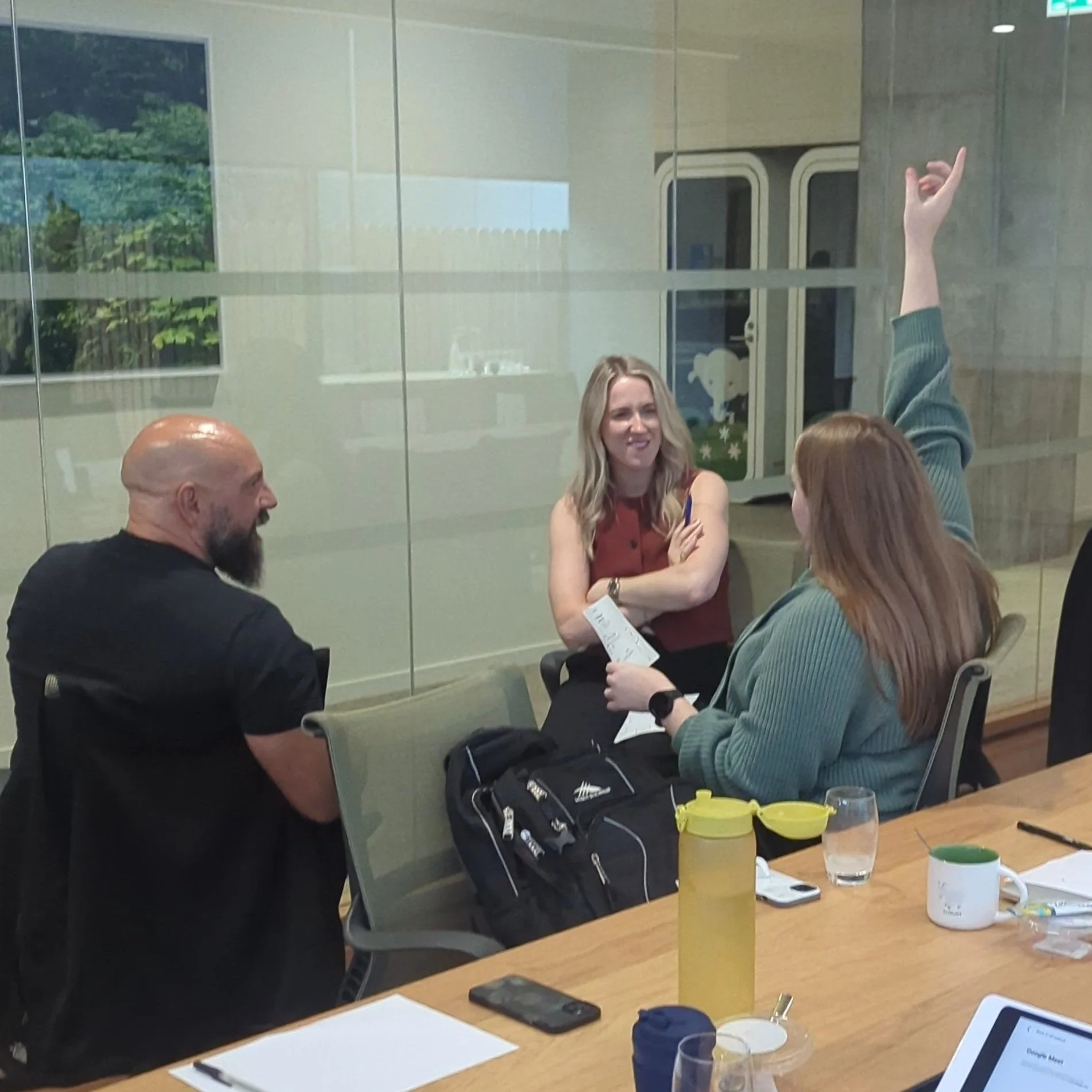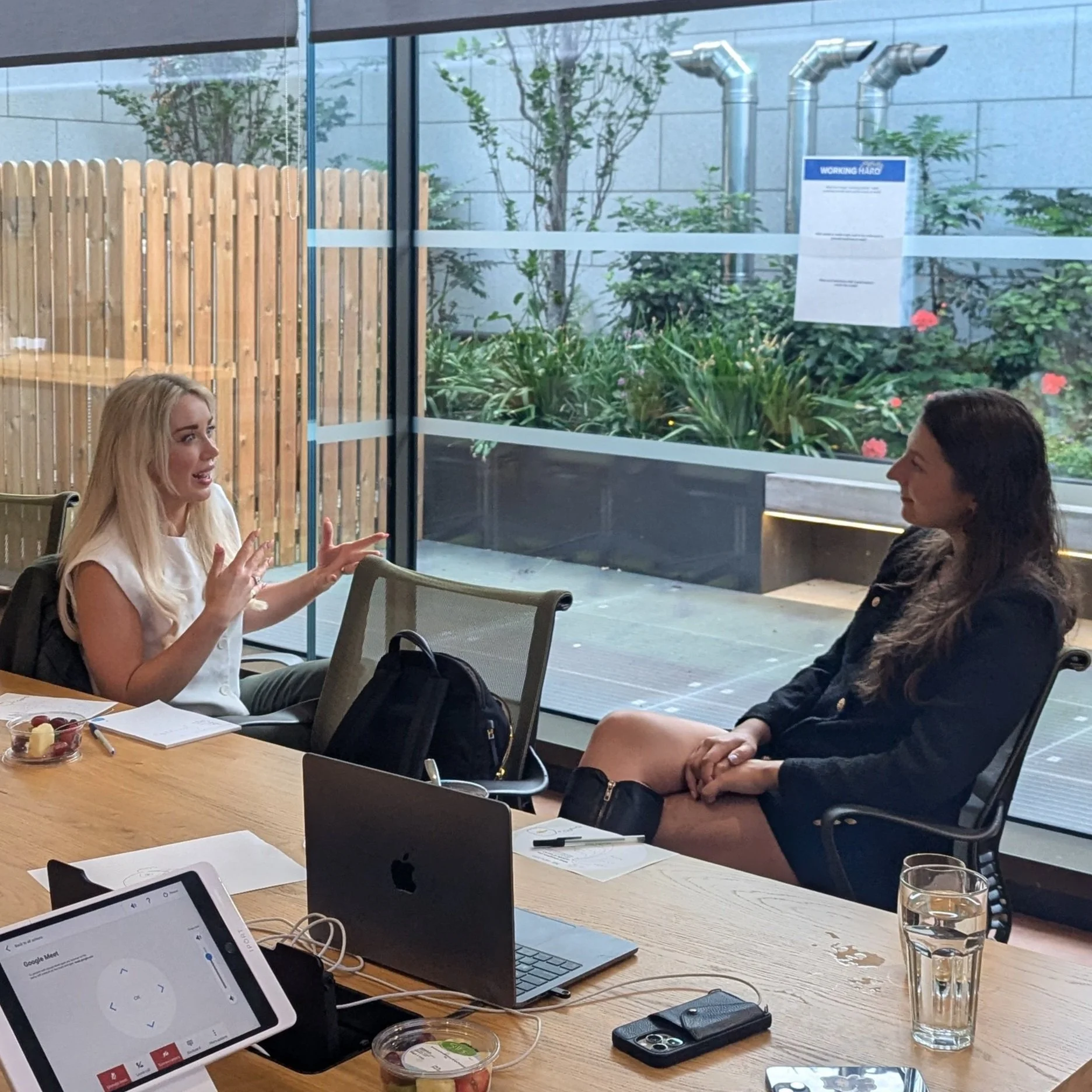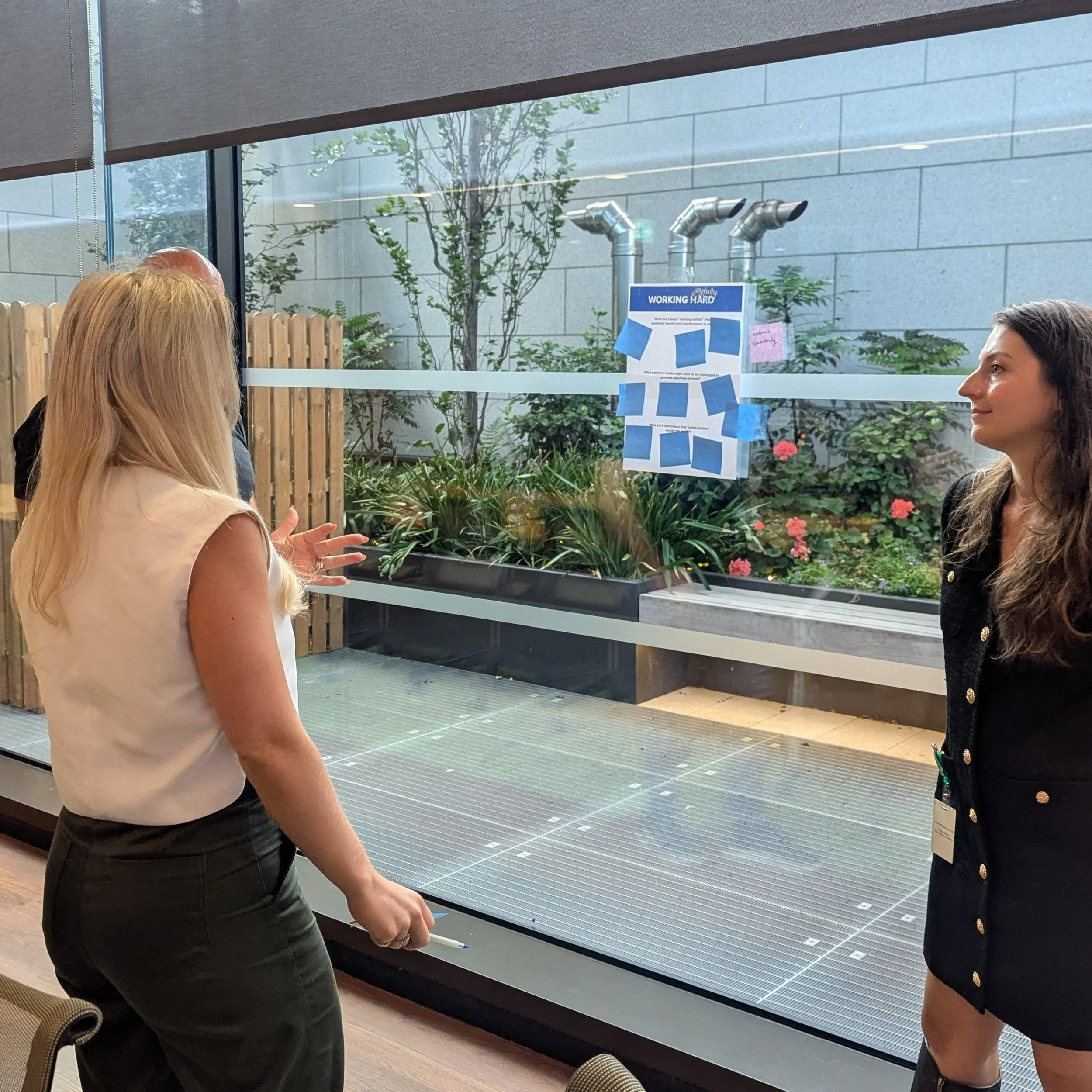Success comes from working hard joyfully
A 90-minute team development workshop focused on Joy Management and the role it plays in high-performance
Earlier this week I was invited to deliver a Joy Management workshop to Niamh Walsh’s leadership team at Salesforce, here in Dublin.
I had originally met with Niamh to discuss running one of Salesforce’s “High Impact Teaming” workshops, but after introducing myself and telling her about my background in Behavioural Science and my passion for Joy Management, she said: “that sounds wonderful and exactly what the team needs!”.
As a side note, this was an incredible opportunity for me! I’ve been working at Salesforce for two years now - with the intention of deepening and refining my coaching and facilitation skills, and expanding my network, before going full time into Connection Academy. To have the opportunity to bring my Connection Academy workshops into Salesforce, and to gain such positive feedback from people who are high-up in Enablement was such a gift and vote of confidence in my vision!
Niamh and I stayed on the phone for 30-minutes - time during which I asked a series of questions to learn more about her team: not only what they do, but the interpersonal dynamics and the general mindset of the group. These “Leader Discovery Calls” are an essential part of my creative process which help me create bespoke workshops tailored to the unique needs of the team.
I had 90-minutes to work with and decided to focus on the following 3 learning objectives:
Align on shared vocabulary to describe joyfulness and the value it brings into your life
Reflect on what energizes you outside of work, and share with one other
Co-creating a new paradigm: exploring what it means to “work-joyfully”
Let me expand on how I guided the group through these 3 points.
1) Align on shared vocabulary to describe joyfulness and the value it brings into your life
When it comes to a topic as nuanced and misunderstood as joyfulness it’s important to start right at the beginning: ensuring that we have a shared vocabulary to describe and understand what joyfulness is.
Human beings use language to bring their worlds into being, and so, there is immense power in bringing awareness to the nuances of vocabulary used to describe something as vast as joyfulness.
I stood in front of a big whiteboard with a marker in my hand and asked the group: “what words come to mind when you think about joyfulness?”.
As they spoke their words out loud; light, cheer, energy, connection, purpose, clarity, humour, flow, I wrote them down on the board and invited them to elaborate, “what do you mean by ‘purpose’?”, “how does purpose connect to joyfulness”?
Next, I focused on an important distinction: joyfulness is not the same thing as happiness.
I explained how joyfulness and happiness are often used interchangeably - even in formal academic research, and how this failure in distinguishing between these two distinct states can prevent us from experiencing either one to its true potential.
When many people think about joyfulness they think about happiness. And because we live in an emotionally illiterate world, many of us think about happiness, and our emotions, as if they exist on some sort of spectrum - ranging from positive to negative, good to bad.
“Positive” emotions, like happiness, fulfilment and pride, are emotions that our society celebrates - and as a result, many of us spend our lives in pursuit of experiences which promise them. “Negative” emotions, like doubt, frustration and insecurity, are ones that our society shuns - and ones which many of us go to great lengths to avoid the experiences which might expose us to them.
Now, while this “makes sense”, it is a mindset which erodes our true sense of wellbeing.
I shared a personal reflection from a course I did on Emotional Agility, with Harvard Medical School Professor Susan David:
What if this binary, fixed way of thinking about emotions, is limiting our experience of life? What if our beliefs about happiness limit our experience of joy?
Because the truth is, joyfulness is not the same thing as happiness. Happiness is a fleeting emotion, often reliant on favourable external conditions. Joyfulness, on the other hand, has been described as a more enduring way of being.
Joyfulness refers to how you approach and engage life. It is in your control.
Or, as I like to say: joy is your responsibility.
This all said, it can still be unclear on what this means on a more practical level. This is why I created a framework which describes the inner-qualities which characterise a joyful way of being.
We went through each of the “5Ps” - once again exploring and creating shared vocabluary to understand what these inner-qualities are, and the value they bring into our personal and professional lives.
30-minutes into the workshop, the group now had a shared vocabulary and understanding of what joyfulness was. Next, it was time to make it personal and move onto the second learning objective.
It is very tempting to intellectualize something like joyfulness. To avoid doing so, I invited participants into a 4-minute self reflection to isolate the things that energize them outside of work. As soon as the timer went off, I invited them to get into groups of 2-3 and share their reflections with one another.
2) Reflect on what energizes you outside of work,
and share with one other
I walked around the room and listened to people openly speaking about how they lose track of time when playing music, spending time outside, and playing with their pets. More importantly, I observed them listening deeply to each other as the energy in the room began to shift.
While debriefing this exercise, one participant shared that much of his work (as the Director of the Sales Leader Coaches) is focused on helping leaders get clarity on their priorities outside of work - because without this clarity, the demands and pressures of work easily erode into one’s personal life. He had hit the nail on the head with the purpose of this simple exercise.
We also spoke about the importance of taking the time to know what most energizes your colleagues, and how to initiate conversations which invite them to speak about what brings them joy. One participant spoke about how these types of conversations are often deprioritized in the workplace, as people tend to focus on the “doing” (productivity, efficiency, output) rather than the “way of being” - which has an obvious impact on the doing.
I closed this part of the workshop by revisiting our vocabulary. The word "enjoy" has its origins in Middle English, specifically from the word "enjoien," which meant "to make joyful". To ‘enjoy’ means to give or create joy. In other words, joyfulness is not something one can be passive about. Enjoying your life is your responsibility. Something which requires active, deliberate intention and effort.
This was the perfect segway into the final 40-minutes of the workshop, in which I invited the group to explore what might be required of them to enjoy the time they spend at work.
3) Co-creating a new paradigm: exploring what it means to “work-joyfully”
I began by sharing the wise words from one of my favourite leadership experts, Stephen Covey (author of the famous “7 Habits of Highly Effective People”).
A paradigm refers to the lens through which you look at life. It frames what you see, and the meaning you give to what you see. It is the foundation upon which all of your beliefs arise, and these beliefs are ultimately what shape your behaviour.
One of the dominant paradigms many people have towards work is one which says “success comes from working hard”. It’s the belief that to work effectively one must be disciplined, have grit, exert themselves, be dedicated, persevere, be determined and so on.
I explained how this way of thinking is not inherently wrong, but can lead us to over-emphasize on behaviours which can lead to stress and burnout - which paradoxically reduce our effectiveness.
I took my audience’s work-experience into consideration when thinking about how to design the next activity. I had 5 people in the room, each having 10-15 years of experience from top management consulting companies like Bain & Co and McKinsey. I referred back to Stephen Covey’s quote, and thought to myself: how might this group take quantum leap changes in how they approach their work? What paradigm shift is needed?
I invited them to get into groups of 3, and for the next 10-minutes to explore a new paradigm: success comes from working hard joyfully. I gave them 3 questions to ground this exploration:
What are 3 ways “working joyfully” might positively benefit one’s performance at work?
What beliefs or habits might need to be challenged to promote joyfulness at work?
What are 3 behaviours that “joyful leaders” would role model?
After the 10-minutes ended, each group shared back their reflections - and what emerged was a beautiful conversation about what human beings need in order to bring their truest, most creative selves to work.
When debriefing this activity, one participant said, “I found this really challenging. We don’t use this kind of vocabulary when talking about work. And so, trying to think about what it means to ‘work joyfully’ is really difficult”. She had spoken directly to the purpose of the exercise: joyfulness is our responsibility and requires us to think differently about how we are approaching life, and work.
To close the session I asked everyone to share one word which described their experience of the last 90-minutes.
Intentional. Practice. Space. Delight. Curiosity.
I loved this workshop. I left feeling so inspired. I can’t wait to do more.













